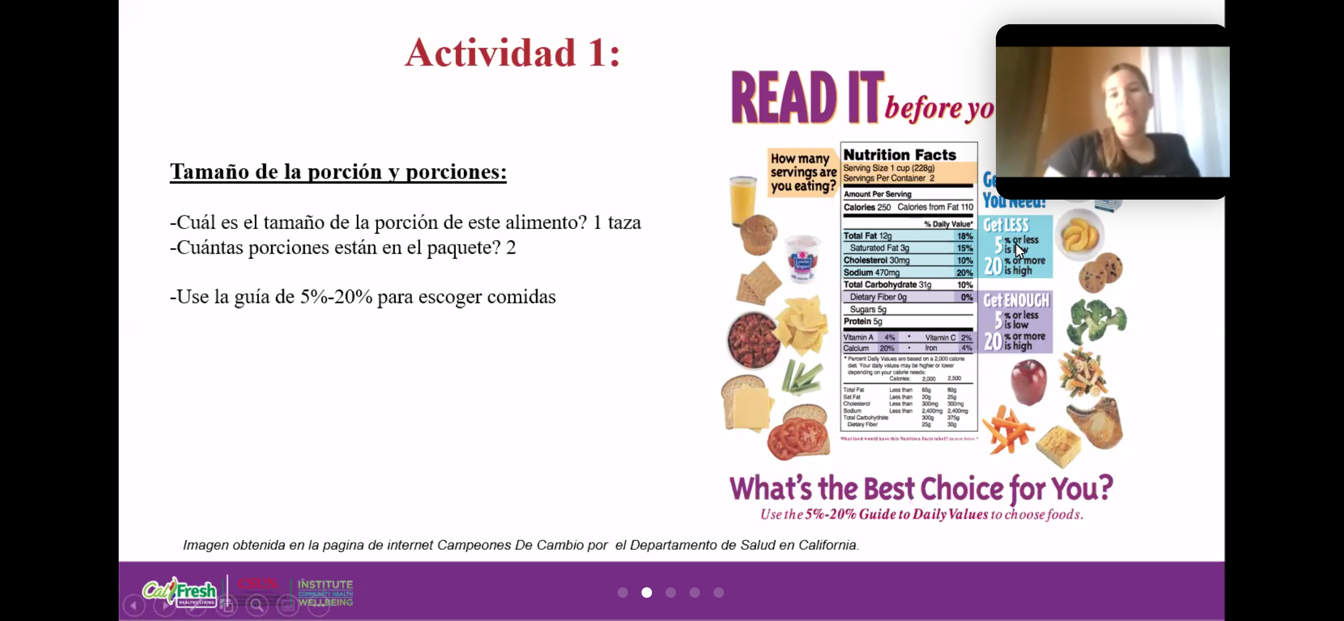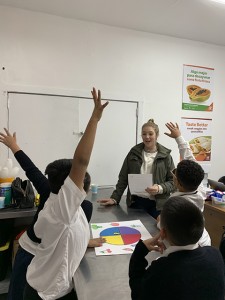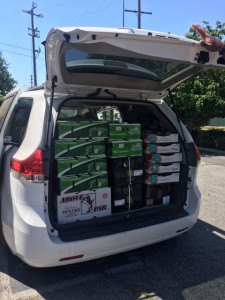As Grant Nears End, CSUN Officials Assess Impact on Health of Community

A screenshot of an online nutrition class hosted by CSUN’s CalFresh Healthy Living initiative. Photo courtesy of Viridiana Ortiz.
When the $895,000 grant was first awarded four years ago, California State University, Northridge officials envisioned creating a program in Canoga Park that combatted obesity by providing nutrition education, promoting physical activity and working to create a healthier environment for low-income individuals and families.
As the grant from the Los Angeles County Department of Health comes to a close next month, members of CSUN’s CalFresh Healthy Living initiative, formerly known as Champions for Change, marveled at the transformation that has occurred in the area while they work to ensure the programs — from community gardens and nutrition education workshops to a food distribution network — continue.
“Our goal was to make a positive impact on the health and wellness of the people who live in Canoga Park, particularly low-income individuals and families, and I think we did,” said Viridiana Ortiz, the initiative’s coordinator.

Children taking part in a nutrition class hosted by CSUN’s CalFresh Healthy Living initiative at the West Valley Boys and Girls Club earlier this year, before the pandemic hit. Photo courtesy of Viridiana Ortiz.
Since the initiative started four years ago, students, faculty and volunteers with CSUN’s Marilyn Magaram Center for Food Science, Nutrition and Dietetics in the College of Health and Human Development and Institute for Community Health and Wellbeing have established 12 community gardens and hosted nearly 800 free nutrition education workshops, often using the community gardens as a learning platform for the community.
Workshops — covering everything from cooking, reading food labels and shopping on a budget to growing your own fruits and vegetables and low-cost, fun ways to be physically active — have been held throughout the Canoga Park area, including at local elementary, middle and high schools, as well as the West Valley Boys and Girls Club, Guadalupe Community Center, the NEW Economics for Women Family Source Center, the Child Development Institute (CDI) Early Learning Center, the Alliance for Community Empowerment and the Salvation Army.
When the COVID-19 pandemic threatened to curtail the CalFresh Healthy Living initiative earlier this year, organizers swiftly transitioned to offering virtual workshops via online platforms such as Facebook and Zoom, as well as creating and sharing wellness videos. They even created an online summer program at the West Valley Boys and Girls Club and the CDI Early Learning Center.
“Our goal was to use whatever platform we could find, from Zoom and Facebook to other forms of social media, to promote easy and affordable recipes, kid-friendly recipes, and garden and wellness videos,” Ortiz said.

A minivan loaded with boxes of fresh fruit and vegetables to be distributed to the community as part of the CalFresh Healthy Living initiative’s pop-up food distribution program. Photo courtesy of Viridiana Ortiz.
In March 2019, the initiative established a pop-up food distribution program. On the fourth Friday of every month, initiative volunteers, students and staff members load boxes filled with fresh fruits and vegetables into the backs of cars for distribution in the community.
Working in collaboration with Food Forward, Earth Island, Freedom Church and CSUN Bridge to the Future Scholars program volunteers, and dietetic interns and fellows, Ortiz said the goal is to “provide and distribute fresh fruits and vegetables to community members in the San Fernando Valley that do not have access to fresh produce otherwise.”
Since the program started, it has distributed approximately 54,000 pounds of fresh produce to 27 organizations that serve community members. About 31,500 individuals in the San Fernando Valley have benefited from the program.
“We are helping to close the gap of food insecurity and food deserts in a sustainable way by redistributing food that has been ‘gleaned,’ or recovered from a surplus of edible food that would have otherwise been thrown away, by Food Forward,” Ortiz said.
Though the grant money has run its course, the grant’s principal investigators, Annette Besnilian, executive director of the Magaram Center, and David Boyns, director of the Institute for Community Health and Wellbeing, have plans to continue the initiative’s efforts in Canoga Park and CSUN community.
“We plan to stay in close contact with all the sites we serve, and continue to provide the community with nutrition education, resources, food demonstrations and other healthy education materials,” Ortiz said.
Among the programs remaining will be the pop-up food distribution effort. Ortiz said students will be taking over the food distribution effort to ensure that fresh fruits and vegetables continue to be provided to underserved communities.

 experience
experience